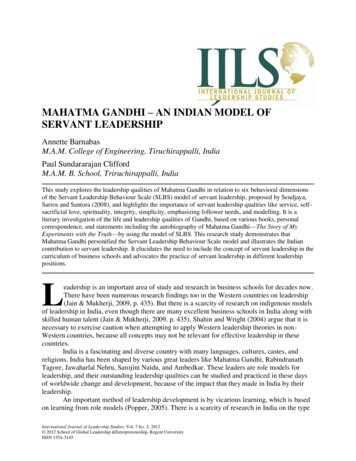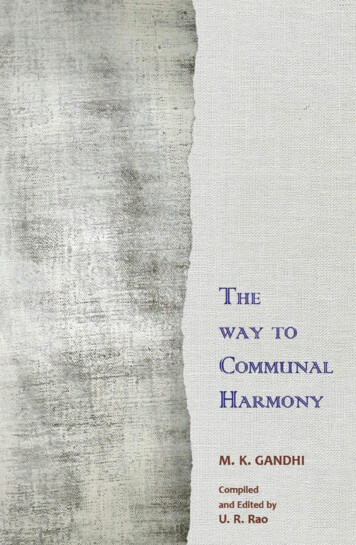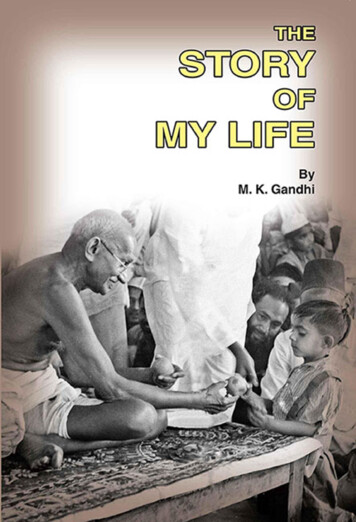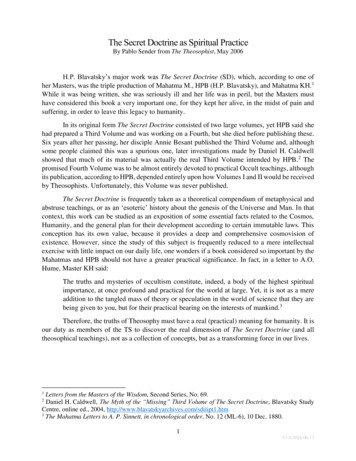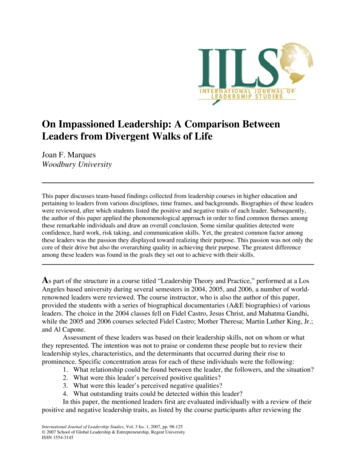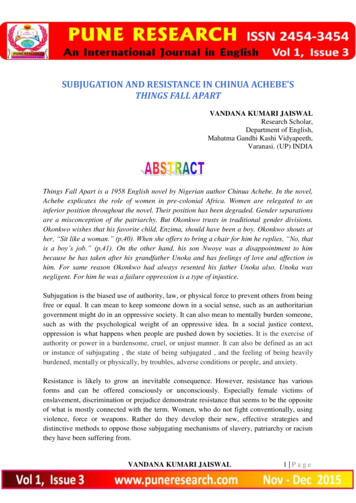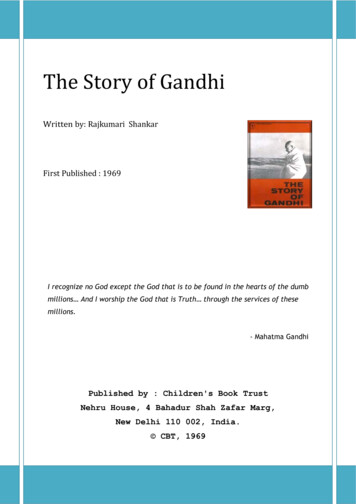
Transcription
The Story of GandhiWritten by: Rajkumari ShankarFirst Published : 1969I recognize no God except the God that is to be found in the hearts of the dumbmillions And I worship the God that is Truth through the services of thesemillions.- Mahatma GandhiPublished by : Children's Book TrustNehru House, 4 Bahadur Shah Zafar Marg,New Delhi 110 002, India. CBT, 1969
The Story of GandhiNEHRU ON GANDHIAnd then Gandhi came, He did not descend from the top:he seemed to emerge from the millions of India, speakingtheir language and incessantly drawing attention to themand their appalling condition. Get off the backs of thesepeasants and workers, he told us, all you who live bytheir exploitation; get rid of the system that producesthis poverty and misery. Political freedom took newshape then and that produces this poverty and misery.Political freedom took new shape then and acquired a new content. Much thathe said we only partially accepted or some times did not accept at all. But allthis was secondary. The essence of his teaching was fearlessness and truth andaction allied to 6these, always keeping the welfare of the masses in view. Thegreatest gift for an individual or a nation, so we had been told in our ancientbooks, was abhaya, fearlessness, not merely bodily courage but the absence offear from the mind. Janaka and Yajnavalkya had said, at the dawn of ourhistory, that it was the function of the leaders of a people to make themfearless. But the dominant impulse in India under British rule was that of fear,pervasive, oppressing, strangling fear; fear of the army, the police, the widespread secret service; fear of the official class; fear of the laws meant tosuppress and of prison; fear of the landlord's agent; fear of the money lender;fear of unemployment and starvation, which were always on the threshold. Itwas against this all-pervading fear that Gandhi's quite and determined voicewas raised; be not afraid. Was it so simple as all that? Not quite. And yet fearbuilds its phantoms which are more fearsome than reality itself, and reality,when calmly analysed and its consequences willingly accepted, loses much ofits terror.So, suddenly as at were, that black pall of fear was lifted from the people'sshoulders, not wholly of course, but to an amazing degree.Jawaharlal Nehru(The Discovery of India)www.mkgandhi.orgPage 2
The Story of Gandhi01. BIRTH & CHILDHOODIn a small, white-washed house in Porbandar, on the coast of Kathiawad inwestern India, Mohandas Gandhi was born on October 2, 1869. His parents wereKaramchand Gandhi and Putlibai. He was small and dark, and looked nodifferent from the millions of other children born in India. Yet this was noordinary child. He was to fight and overcome a great empire and, withouttaking to arms, set his country free. He was to be called the Mahatma, theGreat Soul. Having led his people to freedom, he was to lay down his life fortheir sake.Porbandar is an old sea-port, overlooked by the distant Barda Hills. Even inancient days ships from far off lands went there to trade. It was the ancestralhome of the Gandhi's. The grandfather and father of Mohandas were famous fortheir ability and for their upright character.Grandfather Uttamchand Gandhi, who belonged to a humble family ofmerchants, become the Dewan of Porbandar. He was succeeded by his son,Karamchand Gandhi popularly known as a Kaba Gandhi. Karamchand had verylittle formal education, but his knowledge and experience made him a goodadministrator. He was brave and generous. He had, however, one fault a badtemper.Putlibai, Karamchand Gandhi's wife, was deeply religious. Every day sheworshipped at the temple. She was a lovable and strong willed woman, widelyrespected for her wisdom and good sense. People often sought her advice onvarious matters.Mohandas was the youngest of the six children of Kaba Gandhi. He was thefavourite child of the family and was called 'Moniya' by his fond parents andtheir friends. Moniya adored his mother. He loved his father too, but he was alittle afraid of him.As a child, Moniya seldom liked to stay at home. He would go home for hismeals and then run away again to play outside. If one of his brothers teasedwww.mkgandhi.orgPage 3
The Story of Gandhihim or playfully pulled his ears he would run home to complain to his mother.'Why didn't you hit him? She would ask.'How can you teach me to hit people, mother? Why should I hit my brother? Whyshould I hit anyone? 'Would be Moniya's prompt reply.His mother wondered where her little son got such ideas.Moniya was just seven years old when father leftPorbandar to become the Dewan of Rajkot. Moniya missedPorbandar, and he missed the blue sea and the ships in theharbour.At Rajkot he was sent to a primary school. He was shy anddid not mix easily with the other children. Every morninghe went to school in time, and ran back home as soon asschool was over. His books were his sole companions andhe spent all his free time alone reading.Mohandas at the ageof SevenHe had one friend, however, a boy named Uka. Uka was asweeper-boy and an untouchable. One day Moniya was given some sweets. Heran at once to Uka to share them with him.'Don't come near me little master,' said Uka.'Why not?' asked Moniya, greatly surprised. 'Why can't I come near you?''I am an untouchable master,' Uka replied.Moniya took hold of Uka's hands and filed them with sweets. His mother sawthis from a window, and she ordered Moniya to come in at once.'Don't you know that high caste Hindu should never touch an untouchable? Sheasked sternly.'But why not, mother?' asked Moniya.'Because our Hindu custom forbids it,' she said.'I don't agree with you, mother. I find nothing wrong in touching Uka. He is notdifferent from me, is he?www.mkgandhi.orgPage 4
The Story of GandhiHis mother had no answer. She angrily told him to go and have a bath and sayhis prayers.Karamchand Gandhi loved all his sons, but he was specially fond of theyoungest. He often said to him: 'You must go to high school and college andtake up a profession.'Moniya worked hard, and did his lessons carefully. But he did not learning byheart and was therefore weak in Sanskrit. Geometry he liked best because itinvolved reasoning.Once Moniya happened to read the story of Shravana. Shravana's parents wereold and blind, and he always carried them with him in two baskets slung on ayoke. Moniya was deeply touched by Shravana's devotion to his old parents. 'Imust be like Shravana,' he resolved.At about this time he also saw a play about Harishchandra, a King who wasfamous for his love of truth.'Why shouldn't we all be truthful like Harishchandra?' he constantly askedhimself.Mohandas was only thirteen when he was told that he was soon to be married.His parent has already chosen his bride. She lived in Porbandar and her namewas kasturbai. She and Mohandas were about the same age.The wedding day approached. Mohandas was dressed in new clothes. Everyonewas gaily dressed and the house was decked with flowers and banana leaves.The bridegroom, accompanied by the wedding party, left for Porbandar.In the Bribe's home it was a day of great celebration. There was singing anddancing and music. At the auspicious hour the bridegroom and party arrived.Kasturbai, dressed in red and wearing elegant jewellery, was shy butattractive. Amidst great rejoicing, Mohandas was married to Kasturbai.The celebrations lasted a whole week and then the bride left her home inPorbandar and went with her husband to Rajkot.www.mkgandhi.orgPage 5
The Story of GandhiKasturbai was a pretty and lively girl. Mohandas and she often played together.Mohandas and she often played together. Sometimes Mohandas tried to teachhis young wife, but she could never concentrate on books, though she was quickto learn the household work.One day Mohandas met Sheik Mehtab, a friend of his elder brother. Sheik had abad reputation. Mohandas knew this, yet he was much impressed by Sheikbecause he was strong and tall.Sheik was a meat-eater and he often told Mohandasthat if he ate meat he would also grow tall andstrong.There was also at that time a reform movement for achange in the orthodox ways of life. Mohandashimself had heard that many well-to-do people hadstarted eating meat, so he tried meat. He did notlike the taste of meat but as time went on h estarted to like meat curries.His father, KaramchandGandhiWhenever Mohandas had a meat meal outside, hehad to give his a mother some excuse for not eating his dinner. He knew thathis parents would not forgive him if they knew he had eaten meat. He was notagainst eating meat then, but he was against telling a lie to his mother. Thisfeeling was gnawing at his heart and finally he decided not to touch meatagain.Mohandas has also taken to smoking with Sheik, his brother, and anotherrelative. He had to pilfer small amounts of money here and there with which tobuy cigarettes.One day, in order to pay off a debt which his brother had incurred, Mohandasstole a piece of gold. Stealing was a great sin. He knew that he had committeda great crime. He resolved never in his life to steal again. He wrote down aconfession of his crime and handed the paper to his ailing father.www.mkgandhi.orgPage 6
The Story of GandhiKaramchand Gandhi read the confession. He tore up the paper without saying aword. The bits of paper fell to the floor. He sank back on his bed with a sigh.Mohandas left the room, tears streaming down his face.From that day, Mohandas loved his father more and more. Every day he hurriedhome from school to wait on him. His father's condition grew worse and atlength he died. The house was filled with sorrow.Mohandas was only sixteen when his father died.www.mkgandhi.orgPage 7
The Story of Gandhi02. PREPARATION FOR oljoinedtheSamaldas College at Bhavnagar. As hedid not find the classes interesting, hereturned home after the first term.There a big surprise awaiting him. Hiseldestbrotherandfamilyfriendsuggested that Mohandas should go toEngland to study and become a barrister.Mohandas was thrilled. Here was achance for him to see the world.But his mother did not like the idea ofWith his brother - Laxmidashis going to England. She did not wanther youngest son to stay away from her. There was also the problem of money.Moreover, she feared that Mohandas would lose his caste if he crossed theocean. The family friend assured her that there would be no much difficultyand everything would be all right. But his mother was still opposed to the idea.'I know many reasons why it is dangerous for a Hindu to leave India,' sheexplained to him. 'You will have to eat meat. They drink wine there and youwill be tempted to drink wine. Then you might fall into bad company, andthere are many other temptations which may spoil you.''No, mother,' said Mohandas. 'I am no longer a child. I can look after myself.'He pleaded with her to allow him to go, and he took a vow not to eat meat, notto drink, and not to touch a woman.Putlibai at last gave in and allowed him to go to England. When he left Rajkotfor Bombay, because he had to leave behind his mother, his wife, and his sonwho was only a few months old.www.mkgandhi.orgPage 8
The Story of GandhiOn September 4, 1888, Mohandas left Bombay for England. Dressed in westernstyle, he stood on the deck as the ship slowly steamed out of the harbour. Hewas sad, but he was also excited.Mohandas never forget his first morning on board. He wore a black suit, a whiteshirt, a stiff collar pinched him. It was quite a job to knot his tie property. Thetight, short coat also made him ill at ease. He thought that Indian dress wasmuch more comfortable. Yet a glance in the mirror made him feel proud ofhimself. He thought he looked very impressive.Mohandas was shy. He rarely left his cabin. He even ate his food there alone.He was not sure of all those unknown dishes served on the shop. He thoughtthey might contain meat. He did not wish to break his vow to his mother, so helived mainly on the sweets he had taken with him.www.mkgandhi.orgPage 9
The Story of Gandhi03. IN ENGLANDOn landing at Southampton he looked around. He saw that all the people werein dark clothes, wearing bowler hats and carrying overcoats flung over theirarms. Mohandas was embarrassed to find that he was the only one wearingwhite flannels.In London he stayed at first at the Victoria Hotel. Dr. P.J. Mehta, a friend ofthe Gandhi family, was the first to meet him. Mohandas was impressed with Dr.Mehta's silk top hat. Out of curiosity, he passed his hand over it and disturbedthe pile of the silk. Dr. Mehta then gave him his first lesson in Europeanmanners.'Do not touch other people's things,' he said. 'Do not ask questions as we do inIndia when we meet someone for the first time. Do not talk loudly. Neveraddress people as "sir" whilst speaking to them, as we do in India. Only servantsand subordinates address their masters in that way.'Young Gandhi found everything around him strange. He was homesick. Healmost starved until he discovered a vegetarian restaurant. Struggling to learnwesterners and customs, he rented a suite of rooms. He bought well-tailoredclothes and a top hat. He spent a lot of time before the mirror, parting hisstraight hair and fixing his tie. He took lessons in dancing, but soon gave it upas he had no sense of rhythm. He tried his hand at playing the violin, butfailed. He took lessons in French and elocution, but went to sleep.His attempt to be an Englishman lasted about three months. Then he gave upthe idea. He converted himself into a serious student.'I have changed my way of life,' he told a friend. 'All this foolishness is at anend. I am living in one room and cooking my own food. Hereafter I shall devoteall my time to study.'His meals were simple. He avoided expenditure on transport and went on footeverywhere in London. He started to keep an account of every penny he spent.www.mkgandhi.orgPage 10
The Story of GandhiMohandas joined the London Vegetarian Society and soon found himself in itsexecutive council. He wrote articles for the magazine Vegetarian.The bar examination did not require much study and Gandhi had ample time tospare. Oxford or Cambridge was out of the question because it meant a longcourse and much expense.He therefore decided to appear for the London matriculation examination. Itmeant hard work, but he liked hard work. He passed in French, English, andchemistry but failed in Latin. He tried again, and this time passed in Latin too.Meanwhile he progressed in his study of law; and in November 1888 wasadmitted to the Inner temple.It was the tradition of the Inns of Court for the students to dine together atleast six times each year. The first time Gandhi dinned with his fellow students,he felt shy and nervous. He was sure that the boys would make fun of him forrefusing meat and wine. When wine was offered, he said,' No, thank you.'When Gandhi replied that he never touched wine, the boy shouted to hisfriends,' By Jove, fellows, we are in luck to have this chap sitting with us. Thatgives us an extra half bottle.''You can have my share of roast, too,' Gandhi told them, looking quite contentwith his bread, boiled potatoes, and cabbage. He was pleasantly surprised tofind that his queer habits did not make him unpopular. The next time he wentfor the dinner, he had a pile of law books with him. He was taking the books tohis room to study.'Gandhi,' said the student, 'you are not really going through this stuff, are you?''Look, you chaps,' he cried he isActually reading Roman law in Latin!The students laughed. One of them said,' Let me tell you, Gandhi, I passed thelast examination in Roman law by spending two weeks on a printed summary.Why do you slave at it like this?'www.mkgandhi.orgPage 11
The Story of GandhiGandhi explained to his light-hearted friends that he worked so hard for sheerinterest in the subject, and that he wanted to acquire knowledge for its ownsake.After a short trip to France, he prepared for the final law examination. Theresults were soon declared. He had passed with high marks. On June 10, 1891,he was called to the bar. He was admitted as a barrister and the next day wasformally enrolled in the High Court. The following day, June 12, he sailed forIndia.Gandhi's three-year stay in England was eventful. Those were days of greatintellectual activity, and there was tolerance for every school of thought. Thecountry as a whole was a living university. As Gandhi sailed for home on the s.s.Assam, he felt that, next to India, he would rather live in England than in anyother place in the world.www.mkgandhi.orgPage 12
The Story of Gandhi04. BACK IN INDIAAs his ship steamed into Bombay harbour, Gandhi sawhis brother waiting at the quayside. He ran down thegangway to meet him. As they exchanged greetings,Mohandas noticed that his brother looked sad.'You have bad news for me?' he asked.'Yes,' his brother replied with tears in his eyes. 'We didAs a barrister inJohannesburgnot want to disturb you during your examination. Ourdear mother. She died a few weeks back.'Mohandas was shocked. His mother had meant so much to him. He had comeback to tell her that he had kept the promises he had made before he wentabroad, but now she was no more. What a sad home-coming!At Rajkot, he set up practice as a barrister. Soon however, he was disgustedwith the greed and pettiness that he found among the lawyers. Gandhi realizedthat it was difficult for the poor and the humble to get justice from the courtsof law. He was not happy with his life at Rajkot and he longed to get away.It was then that an offer came to him to go to South Africa on behalf of Dada,Abdullah &co. who owned big business concerns there. They had filed a suitagainst another firm for four hundred thousand dollars. They wanted Gandhi totake up the case because he spoke English well and knew English law. Inaddition to arguing their well and knew English law. In addition to arguing theircase, they wanted him to handle the firm's correspondence in English. Hisservices were required for one year and the company promised to pay ahandsome fee and the first-class return fare.The opportunity to see a new country and new people excited Gandhi and heaccepted the offer.It was painful for him to be parted from Kasturbai again so soon, but he wasdetermined to go. In April 1893 he left Bombay for South Africa.www.mkgandhi.orgPage 13
The Story of Gandhi05. IN SOUTH AFRICAIt was a long journey from India to South Africa. Gandhi reached the port ofNatal towards the end of May, 1893. The first thing he noticed was that theIndians there were treated with little respect. Within a week of his arrival inDurban, he visited the court with Abdulla Seth of Dada, Abdulla &Co.No sooner had sat down than the magistrate pointed his plump finger at him.'You must remove your turban,' he said sternly.Gandhi was surprised. He looked round and saw several Mohammedans andParsees wearing turbans. He could not understand why he was singled out to berebuked.'Sir,' he replied, 'I see no reason why I should remove my turban. I refuse to doso.''You will please remove it,' the magistrate roared.At this Gandhi left the court.Abdulla ran after him into the corridor and caught his arm.'You don't understand,' he said. 'I will explain why these white-skinned peoplebehave like this.'Abdulla continued: 'They consider Indians inferior and address them as 'coolie'or sami'. Parsees and Mohammedans are permitted to wear turbans as theirdress is thought to be of religious significance.'Gandhi's dark eyes flashed with anger.'The magistrate insulted me, 'he said. 'Any such rule is an insult to a free man. Ishall write at once to the Durban press to protest against such insulting rules.'And Gandhi did write. The letter was published and it received unexpectedpublicity. However, some papers describe Gandhi as an 'unwelcome visitor'.www.mkgandhi.orgPage 14
The Story of GandhiAfter a week in Durban, he left for Pretoria to attend to the case for which hehad been engaged. With a first class ticket he boarded the train. At the nextstop an Englishman got into his compartment.He looked at a Gandhi with contempt, called the conductor, and said: 'Take thiscoolie out and put him in the place where he belongs. I will not travel with acoloured man.''Yes, sir,' said the conductorHe then turned to Gandhi. 'Hey sami,' he said, 'come along with me to the nextcompartment.''No, I will not,' said Gandhi calmly. 'I was sold a first class ticket and I haveevery right to be here.'A constable was called in and he pushed Gandhi out with bag and baggage. Thetrain steamed away leaving him on the platform. He spent the night shivering inthe dark waiting-room.Gandhi took this experience to heart and resolved that, whatever the costmight be, he would fight all such injustices. He sent a note of protest to theGeneral Manager of the railway, but the official justified the conduct of hismen.Further trouble was in store for Gandhi on this journey to Pretoria. He had totravel by stage-coach from Charlestown to Johannesburg. Though he had afirst-class ticket, the white conductor would not allow him to sit inside thecoach.'You barrister coolie,' he sneered, 'you can't sit inside with the whitepassengers. Ticket or no ticket, sit outside on the coach-box. That is my usualplace but I will give it to you and take your seat inside.'Gandhi was enraged at this insult, but with a heavy heart he climbed up to theseat behind the driver. He was in no mood for a fight just then.When the stage coach stopped to change horses, the conductor came up toGandhi again.www.mkgandhi.orgPage 15
The Story of Gandhi'Hey sami, you sit below. I want to smoke up here,' he said.And he spread a dirty sack on the step below for Gandhi to sit on. Gandhi flaredup at this.'I had a first class ticket which entitled me to sit inside,' he said. 'You made mesit here, now you want me to sit at your feet! No, I will not do so.''You will have to,' yelled the conductor, and he began to punch Gandhi andtried to drag him down. Gandhi resisted. He held on to the rail, but anotherblow nearly knocked him down.Some of the passengers in the coach began to shout.'Stop that! Leave him alone, conductor,' they cried.'He is in the right. Let him come here with us.'The conductor was forced to let him alone.Gandhi reached Johannesburg the next night, shaken by the incidents on theway. He had address of the Muslim merchant's house there, but as it was ratherlate at night he took a cab to the Grand National Hotel.The hotel manager took a good look at him and said 'sorry, there is no roomvacant tonight.'Gandhi knew that he was denied a room only because of his dark skin. Nowthere was no alternative but to go to the merchant's house, so he went there tospend the night.The next day he bought a first-class ticket and continued his journey by train toPretoria.The only other passenger in the compartment was a well dressed Englishman.As Gandhi entered, the newcomer, and continued reading. A little later theconductor came in. Gandhi quickly showed him his first-class ticket.'Your ticket does not matter, sami,' growled the conductor. 'Go to go the thirdclass at once.'www.mkgandhi.orgPage 16
The Story of GandhiBefore Gandhi could reply, the Englishman flung down his paper and glared atthe conductor.'What do you mean by harassing this gentleman?' he said vehemently. 'His ticketgives him a right to be here.' Turning to Gandhi he said, 'Make yourselfcomfortable just where you are,'Thanking him warmly, Gandhi settled down with a book.It was late in the evening when the train pulled into Pretoria. There wasnobody to meet Gandhi at the station, so he had to spend the night in a hotel.The next day a friend moved Gandhi to a house where he lived as a lodger.There he began his study of the Abdulla law suit. Even while he was engaged onit, he found time to call a meeting of the Indians in Pretoria.This he did with the help of Tyeb Haji Khan Muhammad, an influential Indianmerchant. Only a handful of Indians attended it. It was the first time Gandhihad addressed a meeting.'There was too much division among us,' he said. 'Why should we be kept apartby differences in birth, family, caste, and religion? Let us form a league,representing every group, and keep the government informed of our difficultiesand our needs.'The audience listened to him with great interest. It was decided to hold regularmeetings of all the Indians in Pretoria.Meanwhile, Gandhi was entrusted with the task of translating into English allthe correspondence exchanged between Dada, Abdulla &Co. and the rivalparty. After studying all the facts, he was convinced that this clients' claim wasjust. He knew, however, that if the case was taken to court it would drag onfor a long time, so he called together representatives of both parties.'Why don't you choose a good man, whom you both trust, to arbitrate betweenyou?' he said.The representatives listened to him with great attention. They were astonishedat this new idea he put forward. This young man was not the kind of lawyerwww.mkgandhi.orgPage 17
The Story of Gandhithey were familiar with, but they appreciated his stand and agreed to hissuggestion.An arbitrator was appointed, and he gave his award in favour of Gandhi'sclients, Dada, Abdulla &Co.Although they had won, Gandhi persuaded his clients to be lenient with theiropponent. They agreed not to accept payment in easy installments spread overa long period. Both parties were happy over the settlement.Gandhi's first success as a lawyer was not a crushing victory over an opponent,but the triumph of good sense and humanity.In the Orange Free State, Indians had been deprived of all their rights by a lawenacted in 1888. They could stay there only if they did menial work. Traderswere sent away with nominal compensation.Under the law passed in 1886, Indians who wanted to live in the Transvaal wereforced to pay an annual poll-tax of pound 3 per head. There they were notallowed to possess land except in locations set apart for them. They had nofranchise. If they wanted to go out of their houses after 9 p.m., they had tocarry a permit with them. They were not allowed to remove their grievances.He often went out for an evening walk with an English friend, Mr. Coates andhe rarely reached home before 10 p.m. He had obtained a letter from the stateAtorney allowed him to be out of doors at any time without police interference.One evening Gandhi was alone, walking at his usual brisk pace, when he wassuddenly attacked and knocked down. He was injured. He struggled to his toface a police constable.'That will teach you to obey the law,' shouted the policeman. 'No Indian hasthe right to walk past the President's house. Didn't you know that?' Thepoliceman kicked him.‘Gandhi, are you hurt?’ asked a familiar, friendly voice. It was Mr. Coates. Hehappened to be passing that way when he saw Gandhi being attacked. Mr.Coates warned the policeman.www.mkgandhi.orgPage 18
The Story of Gandhi‘This man is my friend a distinguished lawyer,’ he said. ‘If he brings acomplaint against you, I shall be his witness.’Then he turned to his friend and said, ‘I am very sorry, Gandhi, that you havebeen so rudely assaulted.’‘You need not be sorry,’ said Gandhi. ‘How is the poor man to know? Allcoloured people are the same to him. I have made it a rule not to go to court inrespect of any personal grievance.’‘Just like you,’ said Coates, who was still very angry at the policeman’sbehavior.Coates turned again to the policeman and said, ‘You should tell an Indianpolitely what the regulations are not knock him down.’‘Never mind,’ said Gandhi. ‘I have already forgiven him.’Now that the Abdulla case had been settled, Gandhi thought there was no needfor him to stay on the South Africa. Towards there was no need for him to stayon in South Africa. Towards the end of 1893 he went back to Durban to book hispassage in India. Abdulla arranged a farewell party in his honour.While going through the newspapers that day, Gandhi was surprised to readthat a bill was pending before the Natal Legislative Assembly which woulddeprive Indians of the right to elect members to the Assembly. Here too theywould be disfranchised. He brought this to the notice of the people gatheredthere for the party.‘What do we understand about such matters?’ Abdulla Seth said. ‘We onlyunderstand things that affect our trade.’‘This bill, if it passes into law, will make our lot extremely difficult,’ Gandhisaid gravely. It is the first nail in our coffin. It strikes at the very root of ourself-respect.’The Indians now realized what was at stake; but they were unable to decidewhat to do. They requested Gandhi to postpone his departure and help them.He agreed to stay on for another month and organize resistance to the new bill.www.mkgandhi.orgPage 19
The Story of GandhiLate that night the Indians held a meeting in Abdulla Seth’s house under thepresident's hip of Seth Haji Muhammad, the most influential Indian merchantthere. They resolved to oppose the Franchise Bill with all their strength.Telegrams were went to the speaker of the Assembly and discussion on the bill.The Speaker promptly replied that the discussion would be put for two days.The Natal Indians then drew up a petition to the Legislative Assembly pleadingagainst the bill. This was followed up by another petition to Lord Ripon, thethen Secretary of State for the Colonies. This was signed by more than tenthousand Indians. Copies of the petition were circulated in South Africa,England, and India. There was much sympathy for the Natal Indians' plight, butthe campaign had started too late to stop the bill becoming law.However the campaign did do some good. For the first time, the people of Indiacame to know of ht conditions in Natal. An even more important result was thenew spirit that now awakened the Indians in South Africa.The Natal Indians pre
The Story of Gandhi www.mkgandhi.org Page 3 01. BIRTH & CHILDHOOD In a small, white-washed house in Porbandar, on the coast of Kathiawad in we


